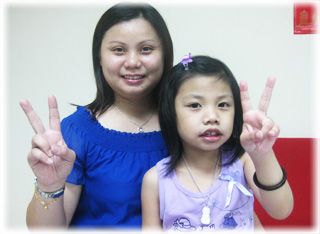 记得当年我女儿Emily, 4岁左右,本应和其他小朋友一样快快乐乐的上学。可是,在上学不久后,幼儿园园长却和我投诉我女儿常常在学校脱衣服、在地上转来转去、在学校走来走去、叫她名字,她也不会回应老师。我听了过后觉得很惊讶,因为Emily除了不太会说话之外,她在家里也没有出现园长所报告的行为。当一位家长告诉我Emily在学校的确是这样,我真的是很紧张和忧心。我尝试向身边的人询问方法和意见,可是,往往他们都只是安慰我说,孩子还小,以后她的情况会慢慢改善。
记得当年我女儿Emily, 4岁左右,本应和其他小朋友一样快快乐乐的上学。可是,在上学不久后,幼儿园园长却和我投诉我女儿常常在学校脱衣服、在地上转来转去、在学校走来走去、叫她名字,她也不会回应老师。我听了过后觉得很惊讶,因为Emily除了不太会说话之外,她在家里也没有出现园长所报告的行为。当一位家长告诉我Emily在学校的确是这样,我真的是很紧张和忧心。我尝试向身边的人询问方法和意见,可是,往往他们都只是安慰我说,孩子还小,以后她的情况会慢慢改善。就在那段寻找方法的阶段,我几乎天天以泪洗脸,觉得很恐惧和感受到来自远方的压力。我们父母对Emily的问题无从下手;她不会说话,也不知道她是否理解我们对她说的话。我们和她没有多余的交流,很多时候她只管自己玩。在这期间,我因为没有办法控制她的行为,而常常打她。现在回想,真的很惭愧。
在我非常无助的时候,我翻阅杂志而看到李莉莉心理咨询师分享有关孩子发展障碍和困难的资讯。当时,我也是抱着“试一试”的心态,打电话联络A Zon生命教育学苑。过后,就积极的安排与李老师做咨询。咨询当中,我们父母才了解到Emily有发展缓慢和过动等学习困难。李老师也建议我们让孩子接受疗育课程。原本我是让Emily一星期上一次疗育课程。一个月后,我就让她一星期上两次疗育课程。另一方面,幼儿园园长竟然向我要求不要让Emily参加学校的concert和迎新会。我想原因是校方没有办法处理孩子的行为,或是怕其他家长会投诉。当下,我的心真的很痛,心里想“我的孩子又不是不正常。为什么她不能像同学一起在concert表演?”。所以我毅然决定为Emily转校。
接受疗育课程的两至三个月后,我开始察觉到Emily的改变。她比较可以接受去外婆家(以前只要去别人家她都会大哭)。渐渐地,她也可以慢慢跟随我去朋友家。 在转校后和在A Zon上课了约6个月后,Emily已经没有乱跑,她开始会讲话,可以作简单的沟通。孩子的行为和自控能力慢慢好转,专注力和沟通能力也有进展。在她5岁后半年,我开始担心她的学习能力。因为她要6岁了,还不会写字,考试听写也不会。A Zon老师们也用心给予孩子专业的疗育。而我也尽量配合做老师们准备的“家课”,让Emily在家也可以练习。
在Emily六岁前半年,我开始慢慢地看到她的进步。她可以写出自己的中英文名字,可以从写对一个听写,慢慢到两个、三个……一直到有一天,她能写对全部听写。虽然我没有期望她全部都会,但是我真的很感恩和欣慰她的进步。除此以外,她也越来越会和我们作语言上的沟通。以前答非所问的情况也越来越少了。明年Emily就要上小学了。我很感恩自己在摸索中找到了A Zon和Emily的第二间幼儿园。前者提供了专注力、自控能力、沟通能力等Emily在学习中所需的能力方面训练。后者则能够接受Emily 有特殊需要的学生。
想对其他家长所的 话
以前我很害怕让别人知道自己孩子有问题。因为自己也不能接受孩子有这方面特殊的需要。其实孩子好坏,取决于父母看家长是否愿意“踏出第一步”。如果发现孩 子有问题,要尽早寻求帮助,咨询心理医生或有关的专业人士。千万不要错过治疗的黄金时间(3-5岁)。有时,我们会因为旁人的安慰而掉以轻心,忽略孩子的 问题和接受帮助的需要。因此,我要鼓励一些和我又同样经历的父母,不要害怕没有面子,而忽视孩子的问题与困难。如果选择了接受专业人士的帮助,父母的角色 也很重要哦。一定要配合疗育老师的安排,在家也要给予孩子训练和关怀。毕竟疗育老师一星期只见孩子两三次,父母陪伴孩子时间也较长。
My daughter, Emily, was about 4 year-old and was supposed to go to school happily as other children. However, after attending school for some time, the principal of the kindergarten complained to me that Emily would often take off her clothes in school, or would spin on the floor, running around in school and would not give any response when her name was being called. I was very shocked and helpless after listening to all these complaints. At home, she would not do anything assigned by the principal, and was generally quiet. When I was told by another parent that Emily was really behaving in this way in school, I was really fearful and worried. I tried asking the people around me, but all of them would only reassure me that my child was still young and things would get better when she grows up.
When I was searching for solutions, I cried almost everyday. I felt fearful and helpless. My parents also could not help with Emily’s problem. She would not speak; at the same time, I did not know whether she could understand what has been told to her. We did not have much interaction. Most of the time, she would just play by herself. During this period, I beat her quite frequently because I had no other ways to control her behavior. In recalling these episodes, I really felt ashamed of what I have done to her.
During the most helpless time, I came across Ms Lee Li Li’s (Consulting Psychologist) column in a magazine, sharing information on child’s development disorders and learning difficulties. At that time, I was hoping to give it a try and contacted A Zon Educare Advisory. Then, I actively scheduled consultation session with Ms. Lee Li Li. During the consultation session, I learned that Emily has developmental delay and hyperactivity problem. Ms. Lee suggested intervention program for my child. Initially, I let Emily attend the program once a week. A month later, I increased it to twice a week after being advised by Ms Lee. On the other hand, the principal of her kindergarten requested not to let Emily to participate in the school concert and orientation. I guessed the school has no idea how to deal with Emily’s problems or perhaps was worried that other parents might complain. At that moment, my heart was really hurt and I thought: “My child is not abnormal; why can’t she participate in the concert with the other children?” I then decided to change school for Emily.
After two to three months of intervention programs, I began to notice improvement in Emily. She was more willing to go to her grandma’s house. Before this, she would only burst into tears. Gradually, she could also follow me to my friends’ house as well. After transferring to the new school and attending programs in A Zon for six months, Emily stopped running around, started to talk and was able to provide simple verbal responses. My child’s behavior and self-control have slowly improved; at the same time, her concentration and communication skills have shown progress too. In the second half of her 5th year and approaching her 6th year, I began to worry about her learning ability. This was because she still did not know how to write and could not spell during her tests. Teachers of A Zon would always give professional intervention classes diligently. I often worked on the teacher’s homework preparation with Emily so that she can have more practice at home.
In the first half of Emily’s 6th year, I began to notice her significant progress. She can write her name in both Mandarin and English. From getting one correct answer in spelling test, she slowly increased to two, then to three ...... until one day, she could get all her spelling correct! Although I did not expect her to know all, I am really grateful and pleased with her progress. In addition, her communication with us and with others keeps improving. Unlike last time, now she seldom gives irrelevant responses. Emily will go to elementary school next year. I am very grateful that I found A Zon and the other kindergarten during this hard time. A Zon has provided help and improved Emily’s learning abilities, such as concentration skill, self-control skill, communication skill, learning skills, etc.
Words for other parents…
Previously, I was very afraid to let others know that my child has problem because I was unable to accept the fact that my child needs such special attention. However, whether our child is good or bad, it totally depends on whether parents are willing to “take the first step”. If you find that your child is encountering problem, you need to seek for professional assistance as soon as possible; consult a psychologist or related professionals. Be sure not to miss the prime time for early intervention, which is from 3 years old to 5 years old.
Sometimes, we may take this matter lightly because of the comforting words from others, and thus ignore the child’s problems and his or her need for help. Therefore, I would like to encourage parents who have the same experience as mine, to not ‘save face’ at the expense of the child's need for professional help. If you choose to seek help from professionals, the role of parents is also very important. Be sure to cooperate and be attuned to the arrangements of teachers and also to give your child additional training at home at the same time.
受访者 Interviewee: Emily 妈妈





